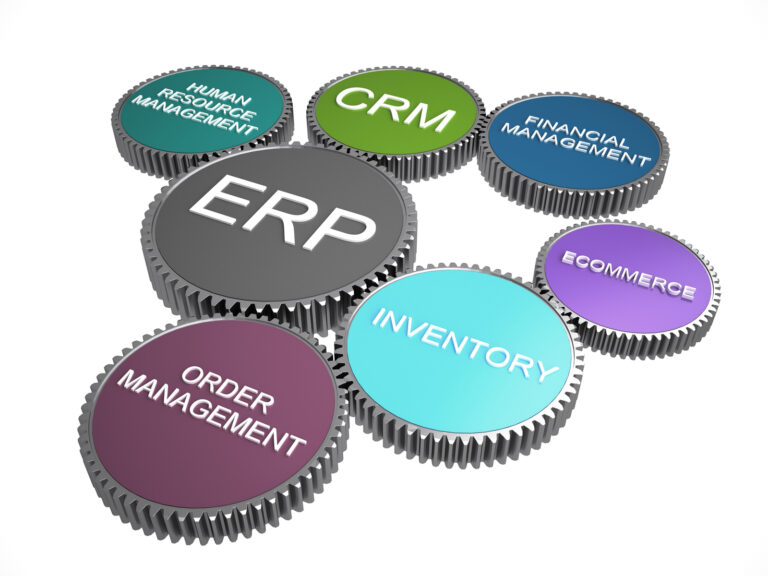Articles

Enterprise Resource Planning (ERP) software, such as Microsoft Dynamics 365 Business Central, and Artificial Intelligence (AI), such as Microsoft Copilot, are two powerful technologies that can significantly impact businesses when used together.
When integrated, they can help businesses reduce costs and duplication, and increase productivity, accuracy, sales, and profits.
Features and Benefits of ERP & AI integration:
- Predictive Analytics: AI can be used to build predictive models that forecast future trends and outcomes based on historical ERP data. For instance, AI can predict future sales trends, demand for specific products, late customer payments, or maintenance needs for machinery. This enables proactive decision-making and helps businesses stay ahead of the competition.
- Data Integration and Analysis: ERP systems are designed to manage and integrate various aspects of a business, such as finance, inventory, sales, purchasing, service, and manufacturing. AI can enhance this by providing advanced analytics capabilities. AI algorithms can process large volumes of data from ERP systems to identify patterns, trends, and insights that might not be immediately apparent. This can help businesses make data-driven decisions and optimize their operations.
- Automation: AI can automate repetitive tasks within ERP systems. For example, AI-powered chatbots can handle routine customer inquiries or employee requests, freeing up human resources for more strategic tasks. AI can also automate data entry and processing, reducing errors and improving efficiency.
- Supply Chain Optimization: AI can optimize supply chain management by analyzing ERP data related to inventory levels, production schedules, and supplier performance. This can help businesses reduce costs, minimize stockouts, and streamline their supply chain operations.
In summary, integrating AI with ERP systems can unlock the full potential of both technologies. AI adds advanced analytics, automation, and predictive capabilities to ERP, helping businesses make more informed decisions, streamline operations, and stay competitive in today’s data-driven business landscape.

Automate Your Business Workflows with Microsoft Power Automate & Dynamics 365 Business Central!
Microsoft Power Automate, formerly Microsoft Flow, is a cloud-based service designed to help businesses automate workflows with little to no coding knowledge. By leveraging Power Automate, organizations can streamline processes, enhance productivity, and reduce manual efforts. It enables users to create workflows triggered by specific events, such as:
- Record creation, modification, or deletion
- External file updates
- Posting of documents
- Integration with Microsoft and third-party applications like Outlook, Excel, Teams, SharePoint, Dataverse, and Power Apps
Power Automate provides four types of cloud flows to meet different automation needs:
- Approval Flow – Streamlines document approvals
- Automated Flow – Triggers processes based on specific events
- Scheduled Flow – Executes tasks at predefined intervals
- Instant Flow – Runs processes on demand
Microsoft Dynamics 365 Business Central is a next-generation, intelligent, cloud-based ERP solution trusted by over 45,000 businesses worldwide. Named the Best Cloud ERP Software by Forbes, Business Central empowers organizations to grow, evolve, and optimize operations across sales, purchasing, supply chain, manufacturing, service, marketing, and financials.
With Business Central, you receive a Power Automate license, allowing you to incorporate Business Central data into automated workflows. The Business Central connector enables seamless integration between internal and external data sources, ensuring efficient automation of key business processes.
Unlock the full potential of Power Automate and Business Central to drive efficiency and innovation within your organization. Contact us today for a personalized demo and see how automation can transform your business!

Microsoft Power BI + Dynamics 365 Business Central – A Dynamic Duo
Power BI is a suite of business analytics tools that delivers insights throughout your organization. Connect to hundreds of data sources, simplify data prep, and drive ad hoc analysis. Power BI transforms your company’s data into rich visuals for you to collect and organize so you can focus on what matters to you. It combines an intuitive user experience with intelligent data visualizations and allows organizations to transform, shape and merge their data – from multiple systems or data sources – into compelling and interactive reports to provide greater depth of data insight.
Power BI enhances Dynamics 365 Business Central by bringing intelligent insights into your daily workflow. The data you need is right at your fingertips – presented in the way that makes the most sense to you. It includes:
- Running Business Central queries in Power BI
- Using the business performance dashboard in Business Central
- Power BI reports – plus filtering options
- Managing and customizing reports
- Data sharing and collaboration through email or Teams
Produce beautiful reports, then publish them for your organization to consume on the web and across mobile devices. Everyone can create personalized dashboards with a unique, 360-degree view of their business, and scale across the enterprise, with governance and security built-in. It transforms your company’s data into rich visuals for you to collect and organize so you can focus on what matters to you.
Power BI provides consistent analysis across your organization – With SQL Server Analysis Services you can easily build robust, reusable models from your data to provide consistency across reporting and analysis in your organization.
Ultimately, Power BI helps users understand not just the “what” but the “why” behind their data.

Benefits of Implementing State-of-the-Art Inventory Management Software – Inventory management software offers numerous benefits to businesses and plays a crucial role in supply chain management. Here are some of the key benefits:
- Enhanced Customer Service: Accurate inventory information and proper planning improves customer satisfaction by ensuring that products are in stock when customers need them. Reduced shipping errors and faster order processing will lead to quicker deliveries.
- Improved Efficiency: Automated tracking of inventory reduces the need for manual data entry which minimizes errors, saves time, and reduces labor costs. Real-time visibility into stock levels helps optimize reorder points, economic order quantities, and safety stock. These features allow for meeting demand while minimizing carrying costs such as storage, transportation fees, capital costs, and insurance.
- Increased Accuracy: Barcode and RFID technology integration ensures precise tracking and eliminates data entry errors. Enhanced accuracy in demand forecasting helps businesses order the right amount of stock at the right time. Accurate data and better understanding of both item availability and demand leads to higher inventory turnover, and greater profits.
- Better Decision-Making: Real-time data and analytics, combined with artificial intelligence and demand forecasting, enable data-driven decision-making in supply chain management. Insights from historical data can help forecast demand, optimize inventory levels and turnover, and identify slow-moving items for clearance or discontinuation. These features enable decision makers to ensure that there is enough goods or materials to meet demand without creating overstocks, or excess inventory.
- Scalability: Flexible inventory management systems can grow with businesses and adapt to changes in inventory volume and complexity. They support multi-location for businesses when new locations are added or warehouses increase in size.
- Accurate Inventory Levels Across the Business: ERP systems can provide an end-to-end view into orders through all departments, from sales to accounting to fulfillment. Centralized purchasing reduces duplication when replenishing stock and enables cost savings through bulk purchasing. In addition, the system provides overview of stock levels in all warehouses, distribution centers as well as retail stores and suppliers.
- Vendor Management: Helps in managing relationships with suppliers by providing data on product demand and lead times.
In summary, inventory management software plays a vital role in optimizing supply chain operations by enhancing efficiency, reducing costs, and improving customer service. It enables businesses to make data-driven decisions, ensuring they have the right products available when customers need them.

